Overview
The article addresses critical solutions for overcoming startup data accuracy challenges through a variety of strategies and tools. It underscores the necessity of reliable information as a cornerstone for operational success.
By leveraging AI-driven tools, conducting thorough data profiling, and establishing robust governance frameworks, startups can significantly enhance their data quality. This improvement not only facilitates better decision-making but also leads to superior business outcomes.
Startups must recognize that the path to operational excellence is paved with accurate data—an imperative for thriving in today's competitive landscape.
Introduction
Startups operate in a fast-paced environment where data accuracy can determine their success. With the stakes higher than ever, addressing data accuracy issues is not merely a technical necessity; it is a strategic imperative. This article delves into ten effective solutions that empower new businesses to confront data accuracy challenges directly, ensuring informed decision-making and optimized operations.
But what occurs when the very data intended to guide these decisions is flawed? The journey toward reliable information is fraught with obstacles. Yet, the rewards of overcoming these hurdles can lead to transformative growth and success.
Websets: AI-Powered Solutions for Data Accuracy in Startups
Websets harnesses advanced AI algorithms to guarantee information accuracy, effectively tackling startup data accuracy problems and offering new businesses a robust solution to elevate their lead generation and recruitment efforts. By meticulously analyzing extensive datasets, Websets empowers users to pinpoint specific details about individuals and organizations, ensuring the information they depend on is both accurate and relevant. This capability is crucial for new businesses to address startup data accuracy problems, enabling them to make swift, informed decisions and mitigate the risks associated with poor information quality. Industry leaders emphasize that precise information is vital for effective prospect generation; startup data accuracy problems can lead to misguided strategies and lost opportunities.
With features like the Fast API and Research Agentic API, Websets enhances its and qualification processes, enabling recruiters and VCs to uncover talent and emerging companies with greater insights, including LinkedIn profiles and emails, thus streamlining their workflows. As AI continues to transform B2B lead generation, overcoming startup data accuracy problems becomes increasingly critical, allowing new businesses to optimize their outreach and recruitment strategies effectively.
Moreover, Websets' flexible high-capacity rate limits and premium support ensure that enterprise clients can depend on a robust infrastructure to meet their evolving demands.
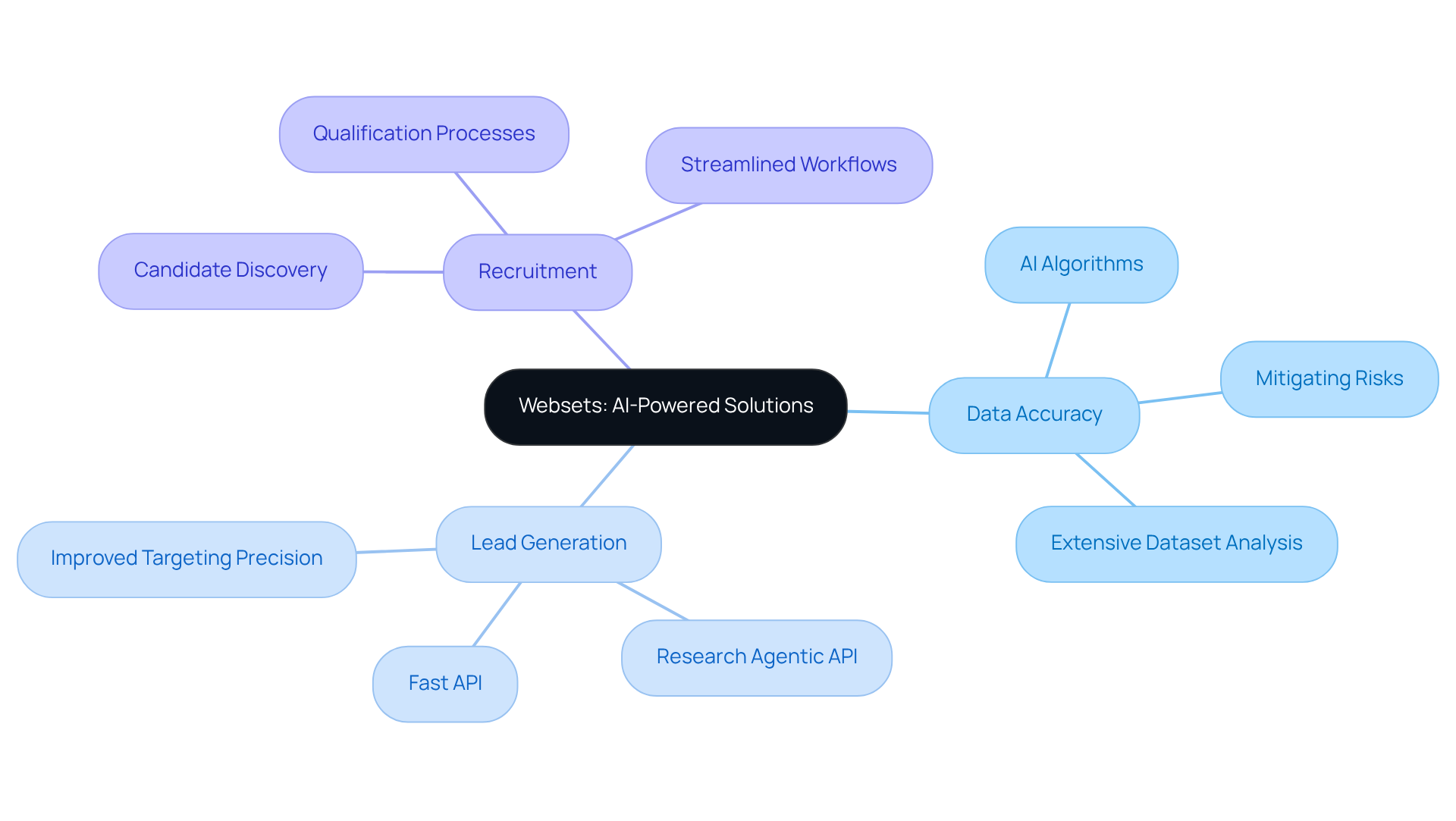
Data Quality Dimensions: Key Aspects of Startup Data Accuracy
Data quality is essential for startups, especially in the context of startup data accuracy problems, and it can be evaluated through several key dimensions: accuracy, completeness, consistency, timeliness, and relevance. Startups must prioritize these aspects to address startup data accuracy problems and ensure their information is dependable and actionable.
- Accuracy is paramount; it refers to the correctness of the information, ensuring that details reflect real-world values. For instance, a customer database must contain accurate names and addresses to facilitate effective communication and marketing strategies. High accuracy is essential for addressing startup data accuracy problems, as it mitigates the risk of errors in analysis and execution, ultimately leading to better decision-making.
- Completeness addresses whether all essential information points are present. The absence of information can result in skewed insights, adversely affecting marketing efforts and strategic initiatives. Startups should strive for comprehensive datasets to enhance their operational efficiency.
- Consistency guarantees that the same information is uniform across different systems and datasets. Unreliable information can lead to uncertainty and diminish confidence in the insights produced, which emphasizes the startup data accuracy problems and makes it crucial for startups to adopt .
- Timeliness measures whether information is available when needed. For example, possessing up-to-the-minute information is vital for industries such as logistics and finance, where prompt decisions can greatly influence operational success. The significance of timely information is underscored by the reality that inadequate quality can cost companies around $12.9 million each year.
- Relevance evaluates whether the information aligns with current business objectives. Unrelated information can clutter analyses and diminish the effectiveness of decision-making tools, while focusing on relevant information ensures resources are directed toward what is most important.
By assessing these aspects, new businesses can identify shortcomings in their information management procedures that lead to startup data accuracy problems and implement remedial measures. As Jay Baer aptly stated, 'the information is certainly present, but not everyone is utilizing it.' This underscores the necessity for new businesses to not only gather information but also ensure its quality for efficient use.
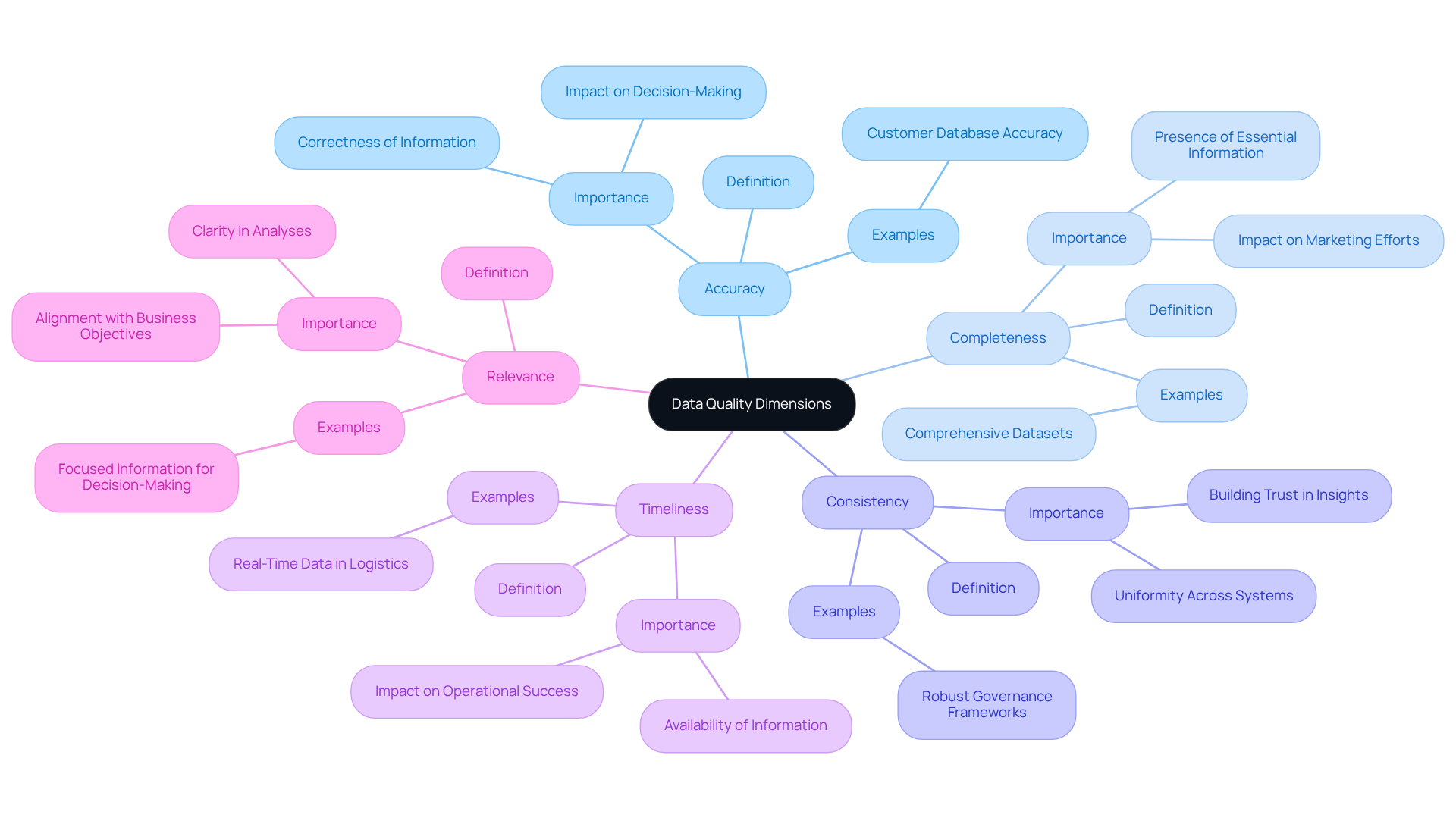
Data Profiling: Assessing and Enhancing Data Accuracy
Data profiling is a critical process for new businesses to tackle startup data accuracy problems, involving a comprehensive analysis of existing datasets to assess their structure and content. By leveraging data analysis, companies can effectively identify and resolve startup data accuracy problems, including inconsistencies, duplicates, and inaccuracies within their records. This not only highlights areas needing improvement but also establishes a foundational baseline for ongoing quality initiatives.
Furthermore, automated information profiling tools can significantly streamline this process, allowing startups to focus on strategic enhancements rather than manual checks. As industry experts assert, 'Information profiling is the crucial step between gathering and utilizing your information,' underscoring its vital role in ensuring accuracy. With only 3% of information meeting standards, as reported by Harvard Business Review, the becomes increasingly clear.
Startups that implement information profiling have observed substantial improvements in their information standards, which helps resolve startup data accuracy problems, leading to more informed decision-making and enhanced operational efficiency. For sales team leaders, improved information accuracy through profiling can directly translate into better lead generation and sales outcomes, making it an indispensable practice for driving business success.
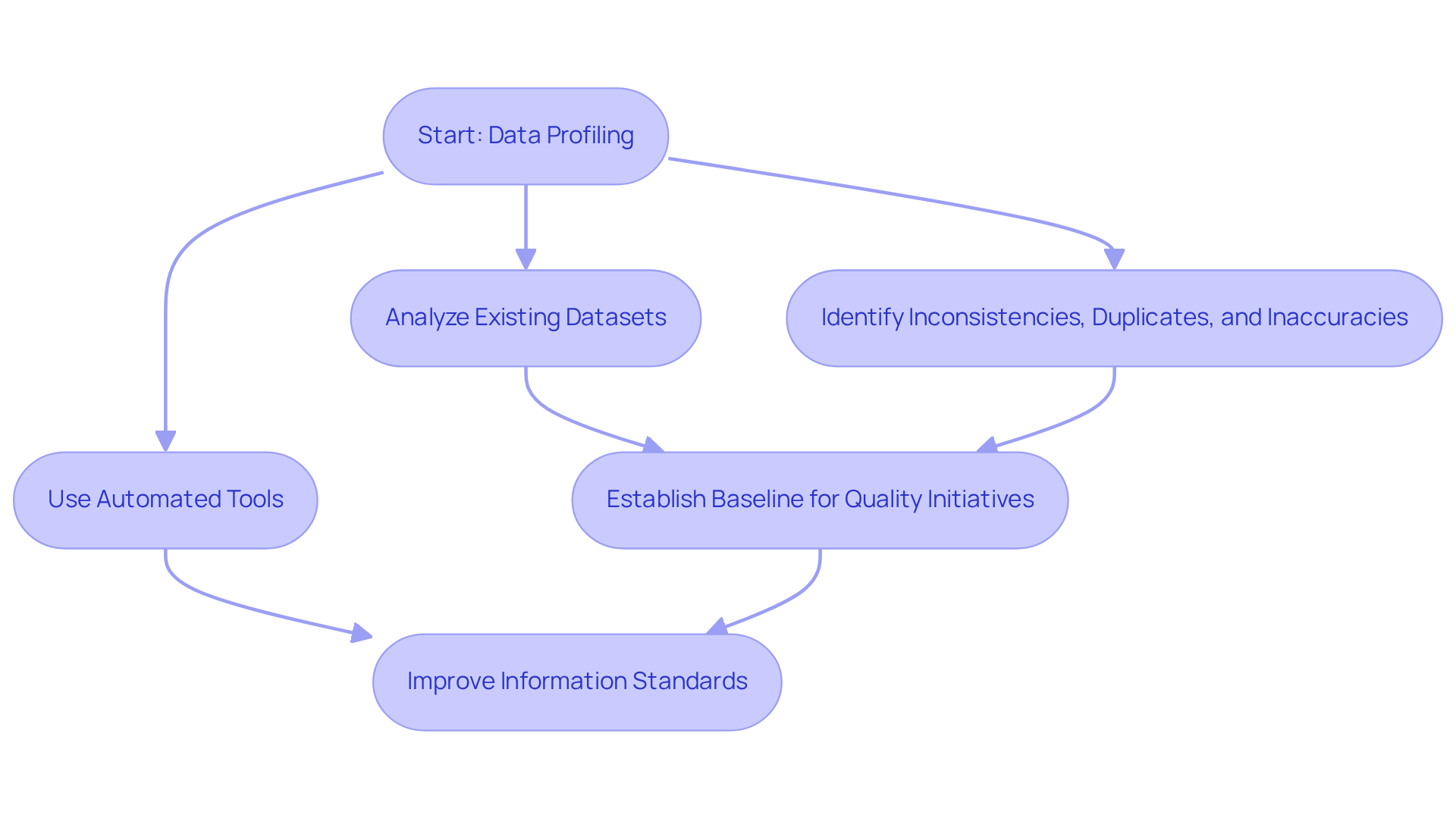
Modern Data Quality Tools: Streamlining Data Management for Startups
Contemporary information management tools are indispensable for startups to address startup data accuracy problems and maintain precise and trustworthy datasets. With essential features like , these tools automate repetitive tasks, significantly reducing the risk of errors and ensuring that information remains current. For instance, systems offering real-time information validation seamlessly integrate with existing workflows, thereby enhancing overall quality and management efficiency.
As W. Edwards Deming famously stated, 'In God we trust, all others bring evidence,' highlighting the critical role of reliable information in strategic decision-making. Current trends reveal an increasing reliance on automated solutions, with projections indicating that 70% of new applications will utilize low-code/no-code platforms by 2025. Many new ventures are adopting tools to tackle startup data accuracy problems, which not only cleanse and verify data but also enrich it, providing deeper insights and fostering improved operational outcomes.
Moreover, it is noteworthy that companies lose 15-25% of revenue annually due to inadequate information standards, emphasizing the financial implications of poor information management. By leveraging these advanced technologies, startups can focus more on their core business operations while ensuring the integrity of their data.
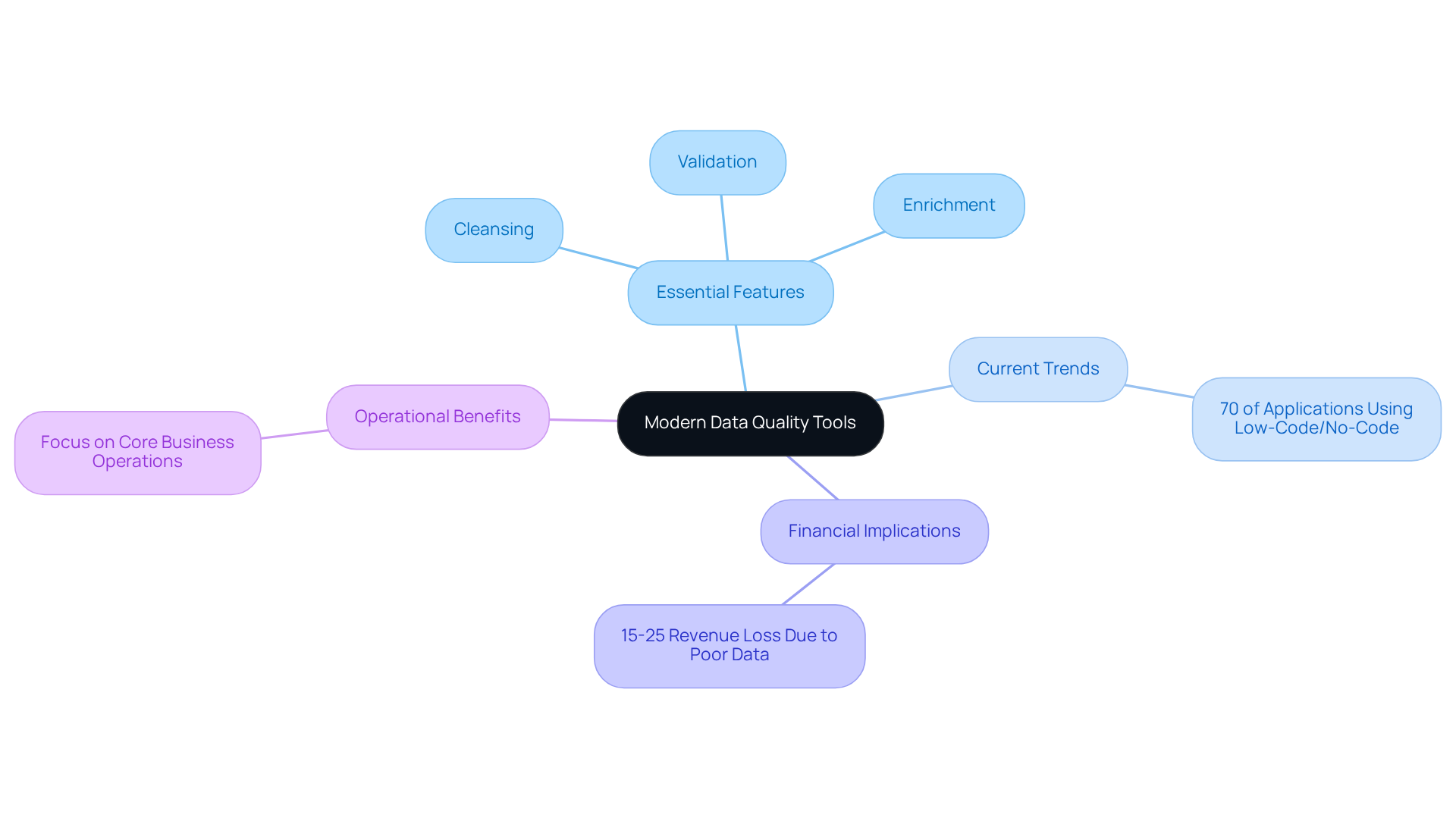
Setting Data Quality Priorities: Focus on Business Use Cases
Startups must strategically recognize and prioritize quality initiatives that align with their unique business use cases. If enhancing lead generation is a primary objective, leveraging Websets' AI-driven tools can significantly improve the accuracy of contact information and lead profiles. Utilizing solutions such as the News Monitor and Hallucination Detector ensures that emerging companies not only maintain but also ensure its relevance to their target audience. Aligning information accuracy initiatives with broader business objectives allows startups to efficiently allocate resources to the most significant areas. This targeted approach drives better outcomes and supports sustainable growth.
Recent research emphasizes that organizations prioritizing information accuracy can significantly enhance their marketing effectiveness and ROI, with some realizing revenue increases of 5-25% based on execution excellence. Furthermore, businesses adopting personalization generally experience a 10-15% revenue increase, underscoring the critical importance of information quality in prospect generation. Notably, almost 75% of marketing teams report difficulties related to startup data accuracy problems, while 91.9% of organizations have received quantifiable benefits from their analytics and investment efforts. This highlights the necessity for new businesses to invest in robust information management practices, such as those provided by Websets, which directly support their client acquisition objectives.
To further enhance information standards, new companies should consider conducting routine evaluations of their contact information to identify and rectify errors. This proactive approach not only mitigates potential issues but also fortifies their market position, ensuring they remain competitive and effective in their outreach efforts.
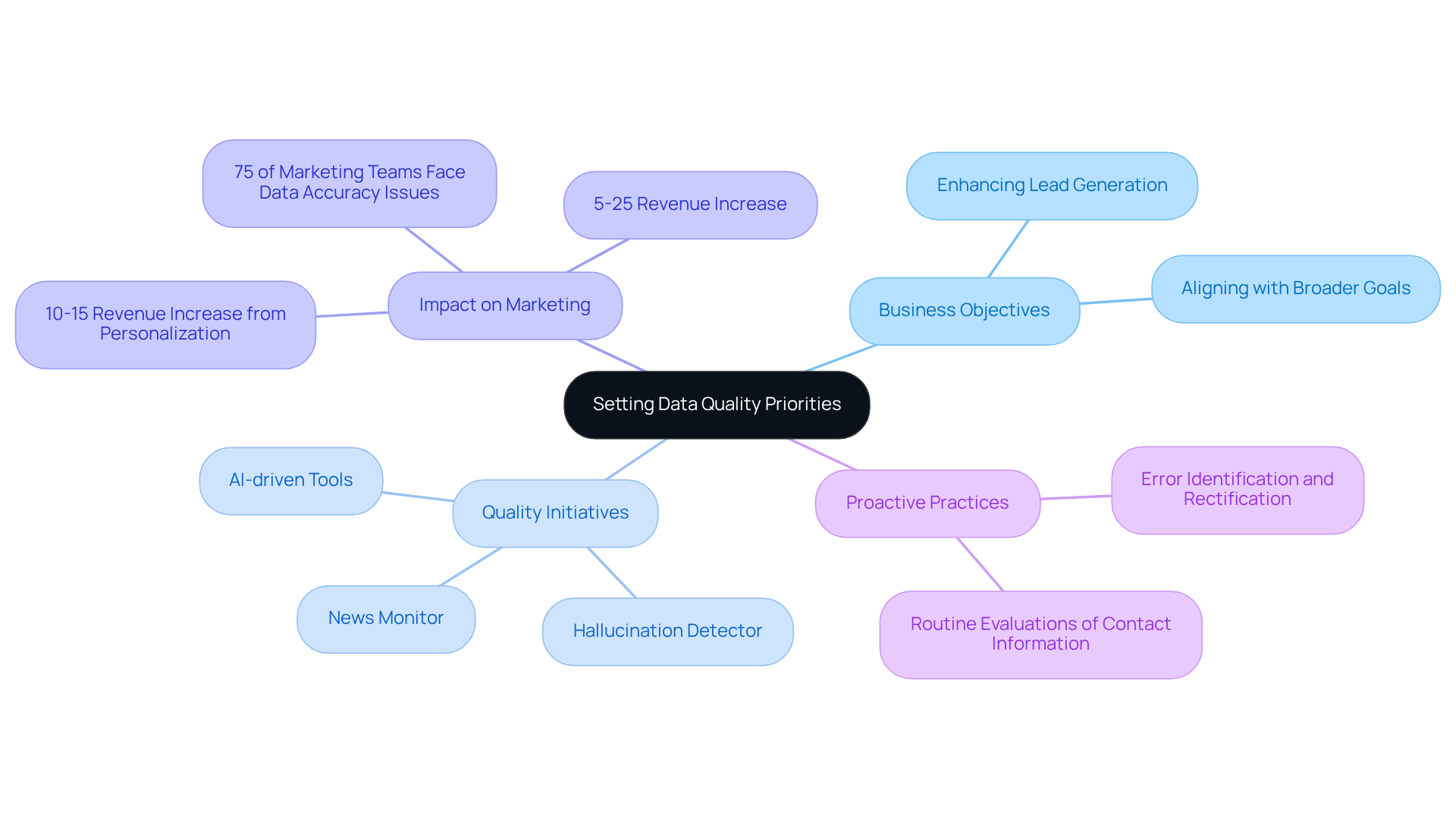
Importance of Data Quality: Impact on Startup Operations
Excellent information integrity is essential for startups to mitigate startup data accuracy problems, which significantly influence operational efficiency, decision-making, and customer satisfaction. Startup data accuracy problems can lead to misguided strategies, wasted resources, and missed opportunities, ultimately hindering growth. Almost half of marketing teams report spending over ten hours each month on information cleanliness, underscoring the inefficiencies created by inadequate information.
As Cristian Randieri observes, "Sustaining excellent information standards extends beyond monitoring these metrics; it necessitates a strategic, organization-wide strategy." Conversely, maintaining precise and dependable information is crucial for startups to overcome startup data accuracy problems, empowering them to make informed decisions, streamline processes, and enhance customer experiences.
Organizations that prioritize information integrity initiatives not only boost operational efficiency but also cultivate customer confidence and satisfaction. The repercussions of can be severe, leading to reputational and financial damage.
By investing in robust information governance frameworks and automated solutions—92% of organizations are considering or have already invested in platforms that automate governance of relevant information—startups can position themselves for long-term success and competitiveness in their markets, ensuring that their information reflects real-world values and supports strategic objectives.
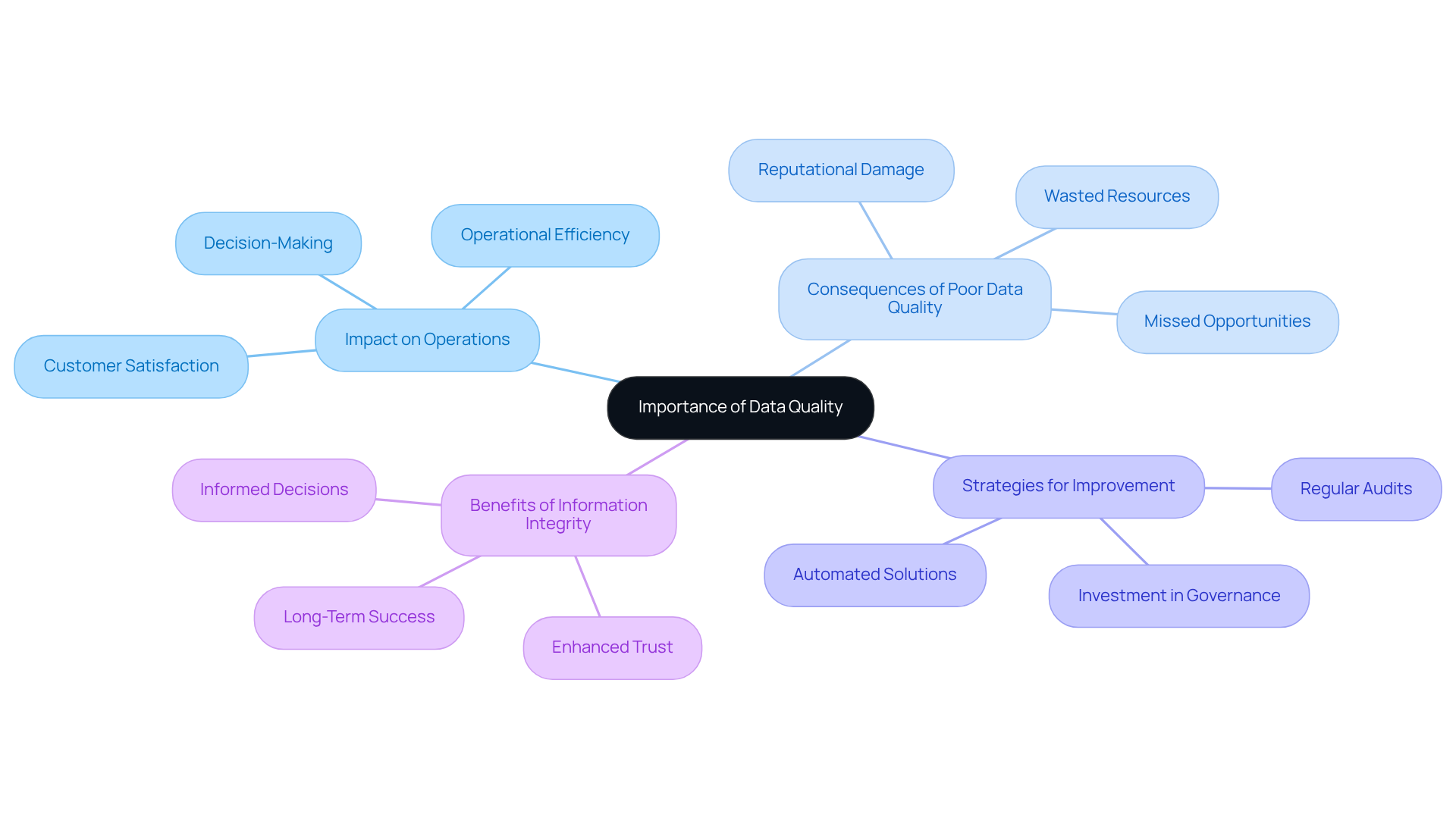
Analyzing Results: Measuring Success in Data Quality Initiatives
To effectively assess the success of information enhancement initiatives, startups must establish specific metrics and KPIs that address and align with their overarching business objectives. Key performance indicators may involve:
- Monitoring entry precision
- Reducing duplicate records—which can occur from input errors or system issues
- Improving conversion rates
Studies show that firms with strong information management practices can experience lead conversion rates increase by as much as 30%.
Moreover, firms with more information-literate employees are more likely to thrive in an information-rich environment, highlighting the significance of information literacy in attaining these enhancements. Frequent assessment of these metrics allows new businesses to gauge the effect of their information standards initiatives and tackle startup data accuracy problems accordingly. By fostering an environment of ongoing enhancement and employing the People, Process, Technology (PPT) framework, startups can guarantee their information enhancement initiatives not only stay pertinent but also lead to substantial business results.
As information integrity expert Veda Bawo observes, 'You can possess all of the sophisticated tools, but if your information standard is poor, you're nowhere.' This emphasizes the importance of prioritizing information integrity to mitigate startup data accuracy problems as a fundamental aspect of business success. Moreover, as Thomas Redman wisely notes, 'Where there is information smoke, there is business fire,' emphasizing the crucial importance of information integrity in fostering business success.
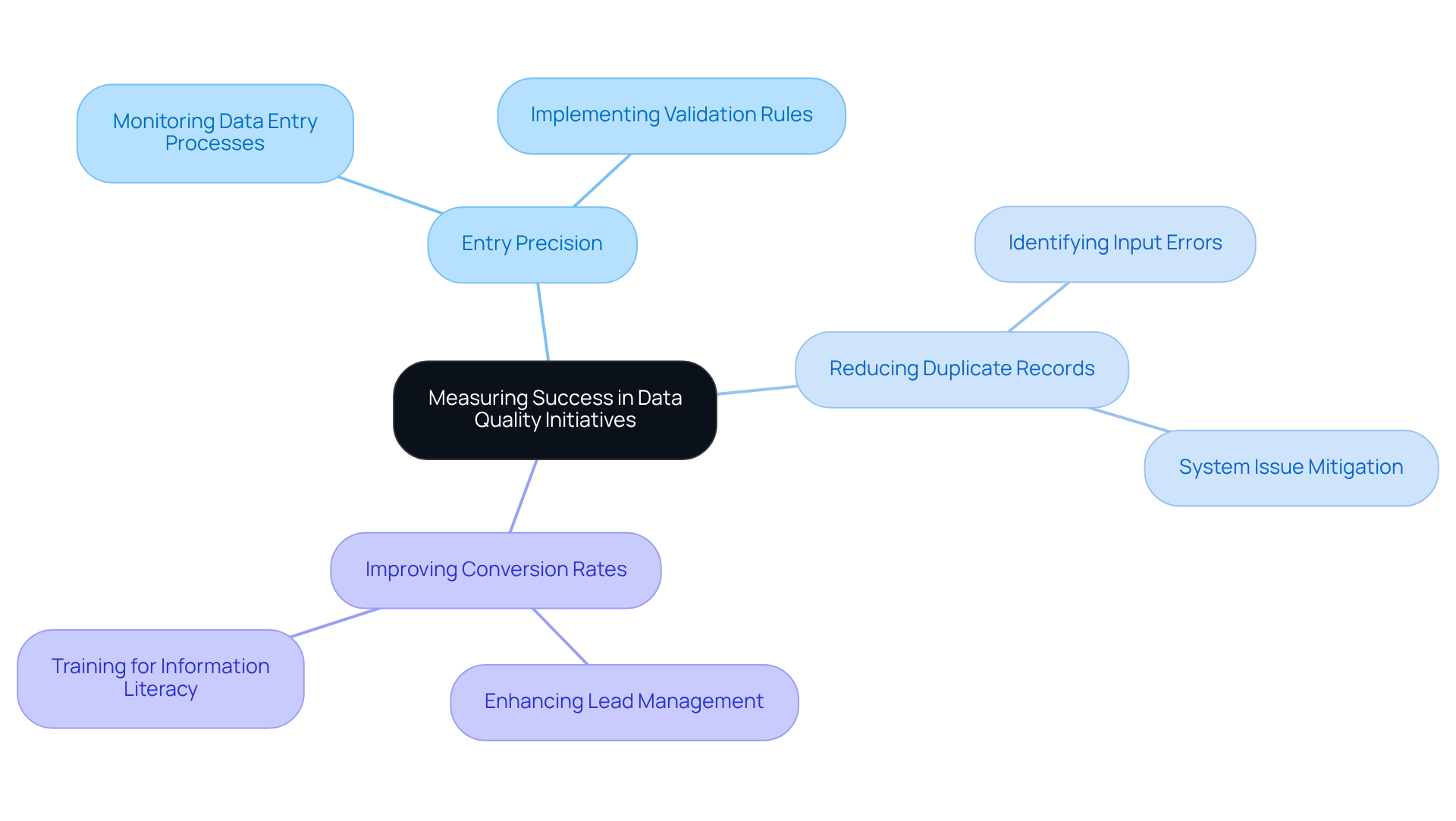
Data Quality Metrics: Tracking Progress and Improvement
To ensure ongoing enhancements in information integrity, new businesses must establish a robust framework for monitoring essential metrics, which should address as well as completeness percentages. By consistently reviewing these metrics, organizations can identify trends and evaluate the effectiveness of their information improvement initiatives. For instance, tracking the frequency of information updates allows companies to keep their collections current and relevant. Industry experts emphasize that without accurate information, efforts in data science can become futile, highlighting the critical need to uphold high standards of information integrity. Michael Stonebraker warns that inaccuracy renders analytical initiatives ineffective, emphasizing the startup data accuracy problems and the necessity for startups to prioritize information standards.
Moreover, monitoring the enhancement of information integrity over time not only aids in making informed decisions about future investments in information management but also fosters a culture of accountability within the organization. As businesses increasingly recognize that high-quality information is vital for successful sales and marketing efforts, they can leverage these insights to drive improved outcomes. A statistic reveals that 67% of analytics leaders view organizational culture as the most significant barrier to becoming a data-driven organization, illustrating the challenges new businesses face in monitoring information metrics. By adopting a proactive approach to information integrity, new businesses can ensure that their data remains a valuable asset, ultimately enhancing their operational efficiency and strategic decision-making. Furthermore, utilizing technological solutions like profiling tools such as Talend Data Fabric and Informatica Data Explorer can significantly bolster information enhancement initiatives.
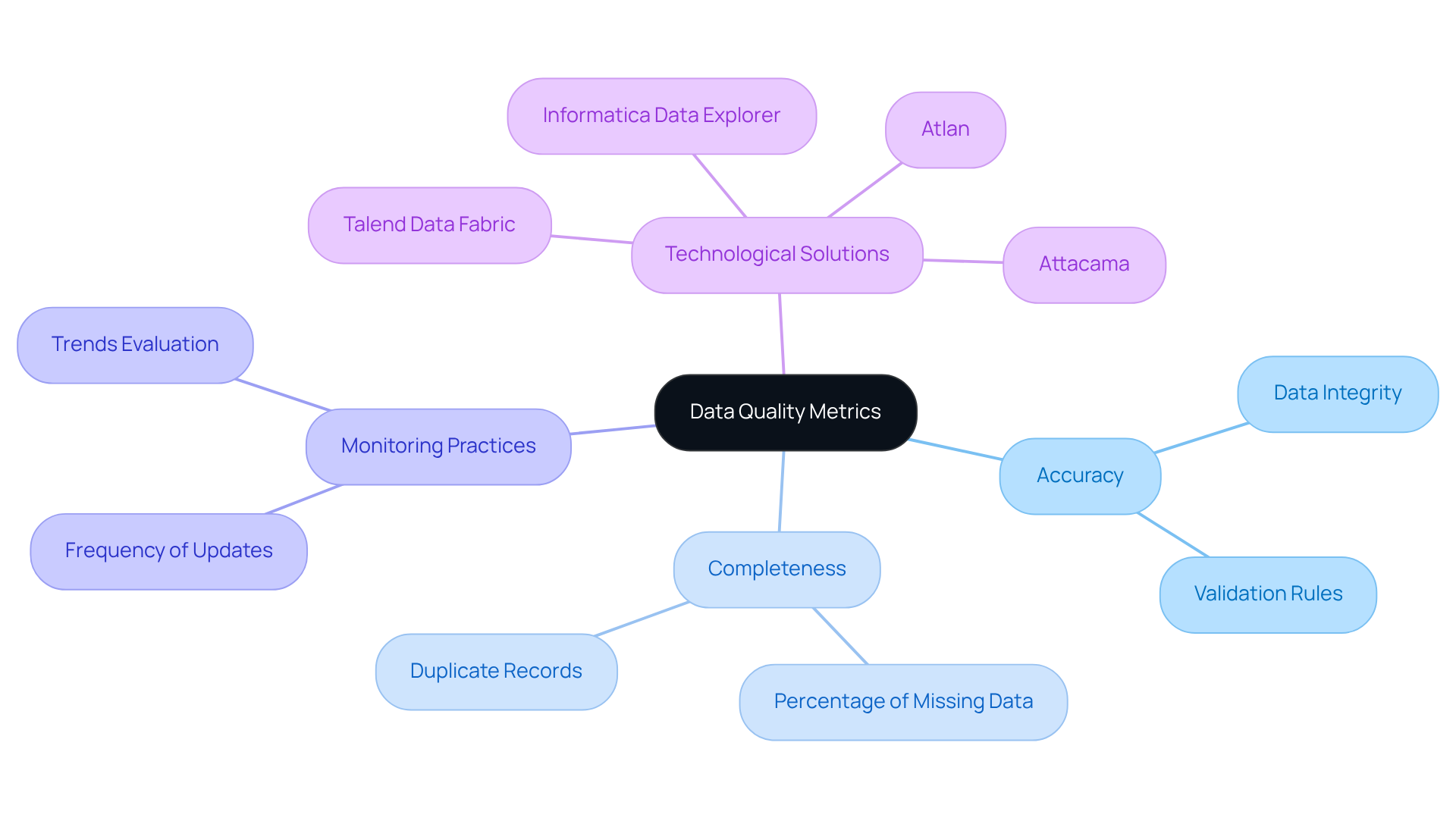
Balanced Approach: Effective Data Quality Improvement Strategies
To enhance effectively, startups must adopt a balanced strategy that integrates technology, processes, and personnel. This strategy involves:
- Investing in contemporary information integrity tools
- Establishing clear governance policies
- Fostering a culture of information stewardship among employees
Furthermore, educating personnel on best practices in information management and promoting collaboration across divisions can significantly boost the effectiveness of these initiatives. By implementing these strategies, new ventures can create a robust framework for maintaining high information quality standards.
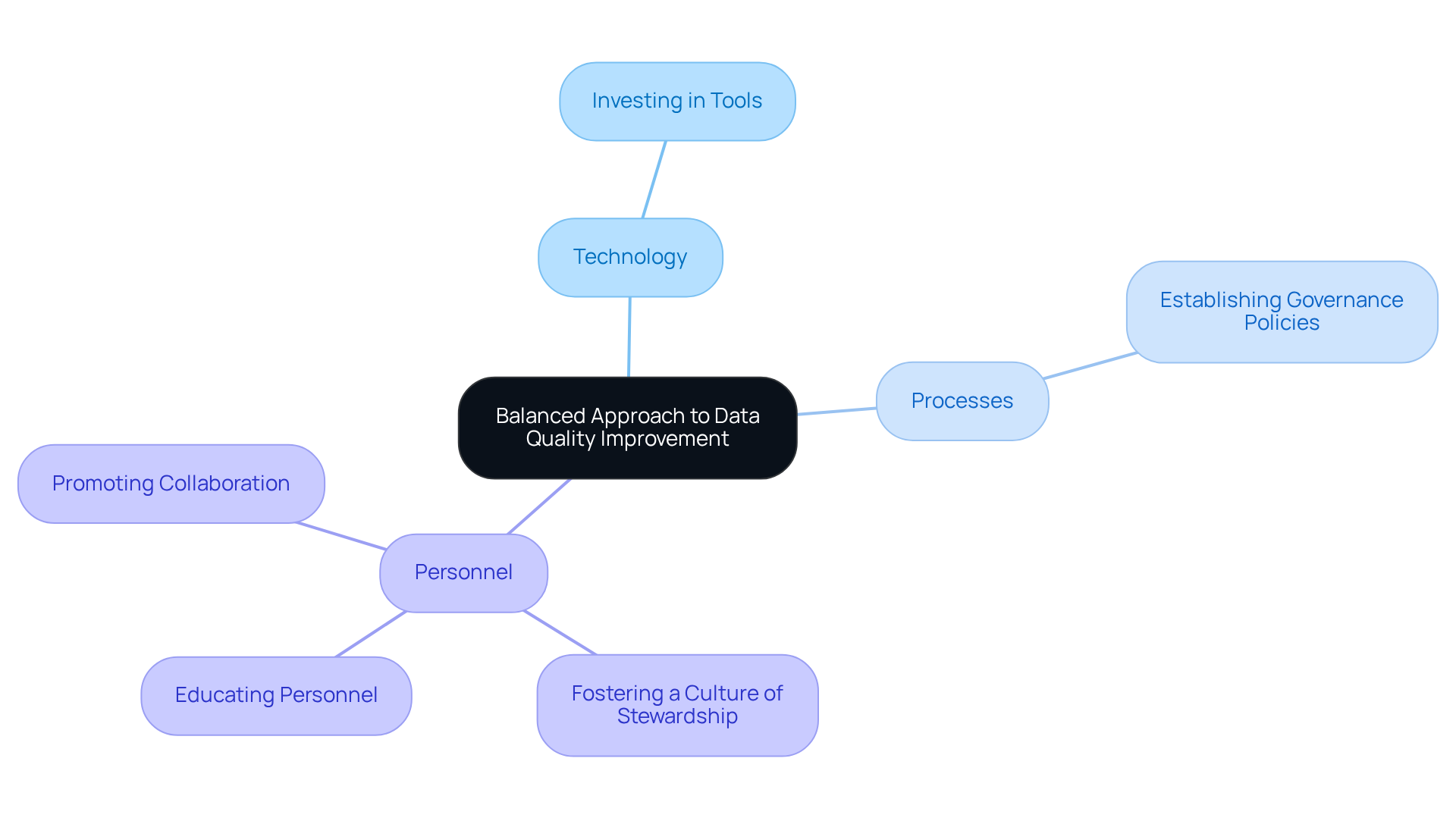
Cost Reduction and Better Decision-Making: Benefits of Improved Data Accuracy
Enhanced information accuracy is essential for startups to overcome startup data accuracy problems, yielding significant cost savings and improved decision-making capabilities. Dependable information minimizes errors associated with startup data accuracy problems that can result in costly miscalculations, such as targeting the wrong audience or misallocating resources.
Companies leveraging precise analytics gain a clearer understanding of market trends and customer preferences, allowing them to adapt strategies effectively to shifting demands. This proactive approach not only bolsters but also propels profitability and growth.
Notably, industry specialists emphasize that organizations prioritizing information quality are three times more likely to report substantial improvements in decision-making. By investing in data integrity, startups can effectively tackle startup data accuracy problems and position themselves to make informed strategic choices that cultivate sustainable success.
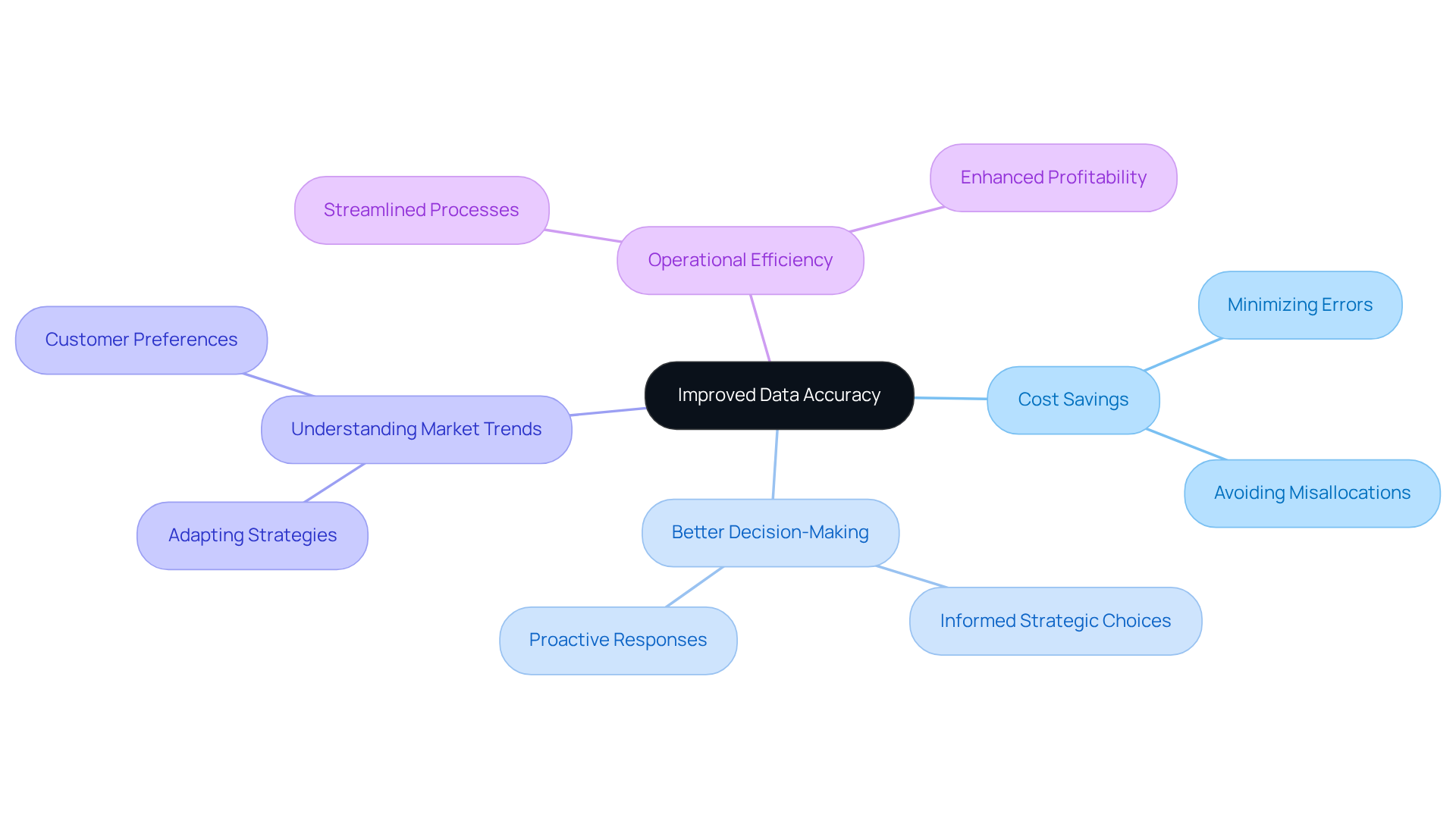
Conclusion
Addressing startup data accuracy problems is not merely a technical necessity; it is a strategic imperative for new businesses striving to thrive in a competitive landscape. By implementing robust solutions that enhance data integrity, startups can significantly improve their operational efficiency and decision-making processes. The insights provided throughout this article underscore the importance of adopting a multifaceted approach to data quality, integrating advanced AI tools, effective governance frameworks, and continuous monitoring practices.
Key arguments highlight that data accuracy encompasses various dimensions, including:
- Accuracy
- Completeness
- Consistency
- Timeliness
- Relevance
Each of these aspects plays a critical role in ensuring that startups can make informed decisions, streamline their operations, and ultimately drive growth. Furthermore, leveraging modern data quality tools and techniques, such as data profiling, empowers startups to identify and rectify inaccuracies, thereby enhancing their overall information management strategies.
In conclusion, the significance of prioritizing data quality cannot be overstated. Startups must recognize that investing in reliable data management practices not only mitigates risks associated with poor information but also opens doors to new opportunities and increased profitability. Embracing these strategies will empower new businesses to navigate the complexities of the market with confidence, ensuring they remain agile and competitive in an ever-evolving landscape.
Frequently Asked Questions
What is Websets and how does it help startups?
Websets is an AI-powered solution designed to ensure data accuracy for startups. It addresses startup data accuracy problems by analyzing extensive datasets, enabling users to obtain accurate and relevant information about individuals and organizations, which is essential for effective lead generation and recruitment.
Why is data accuracy important for startups?
Data accuracy is crucial for startups as it allows them to make informed decisions and mitigate risks associated with poor information quality. Precise information is vital for effective prospect generation, and inaccuracies can lead to misguided strategies and lost opportunities.
What features does Websets offer to enhance recruitment and lead generation?
Websets offers features like the Fast API and Research Agentic API, which enhance AI-driven candidate discovery and qualification processes. These tools help recruiters and venture capitalists uncover talent and emerging companies with insights, including LinkedIn profiles and emails.
What are the key dimensions of data quality that startups should focus on?
Startups should focus on five key dimensions of data quality: accuracy, completeness, consistency, timeliness, and relevance. These aspects help ensure that the information is dependable and actionable.
How does accuracy impact startup operations?
Accuracy refers to the correctness of information, ensuring that details reflect real-world values. High accuracy mitigates the risk of errors in analysis and execution, leading to better decision-making and effective marketing strategies.
What does completeness mean in the context of data quality?
Completeness refers to the presence of all essential information points. Missing information can skew insights and adversely affect marketing efforts and strategic initiatives, making comprehensive datasets vital for operational efficiency.
Why is consistency important for data accuracy?
Consistency ensures that the same information is uniform across different systems and datasets. Unreliable information can lead to uncertainty and diminish confidence in insights, making it crucial for startups to adopt strong governance frameworks.
How does timeliness affect decision-making in startups?
Timeliness measures whether information is available when needed. Up-to-date information is vital for prompt decision-making, especially in industries like logistics and finance, where delays can significantly impact operational success.
What role does relevance play in data accuracy?
Relevance evaluates whether the information aligns with current business objectives. Focusing on relevant information ensures that resources are directed toward what is most important, enhancing the effectiveness of decision-making tools.
What is data profiling and why is it important for startups?
Data profiling is a process that involves analyzing existing datasets to assess their structure and content. It helps identify and resolve startup data accuracy problems, such as inconsistencies and inaccuracies, and is vital for ongoing quality initiatives.
How can automated information profiling tools benefit startups?
Automated information profiling tools streamline the data profiling process, allowing startups to focus on strategic enhancements rather than manual checks. This can lead to substantial improvements in information standards and better decision-making.
What impact does improved information accuracy have on sales outcomes?
Improved information accuracy through data profiling can directly translate into better lead generation and sales outcomes, making it an essential practice for driving business success.




